Contract Law Analysis: Sparkles, Australian Phones, and Cases
VerifiedAdded on 2019/12/18
|7
|2673
|234
Case Study
AI Summary
This assignment provides a comprehensive analysis of contract law principles through three distinct scenarios. The first scenario involves Rosso, who contracted Sparkles for house cleaning but found the house damaged, leading to a discussion of breach of contract and misleading conduct under Australian Consumer Law. The second scenario examines Dennis's contract with Sparkles, focusing on undue influence and the right to terminate the contract. The third scenario involves Ted and Belinda, exploring the concept of unconscionability in contract law, particularly in the context of Ted's medical condition and Belinda's actions. The analysis covers legal concepts such as misleading and deceptive conduct, undue influence, unconscionability and the importance of valid consent, supported by relevant case law and legislation.
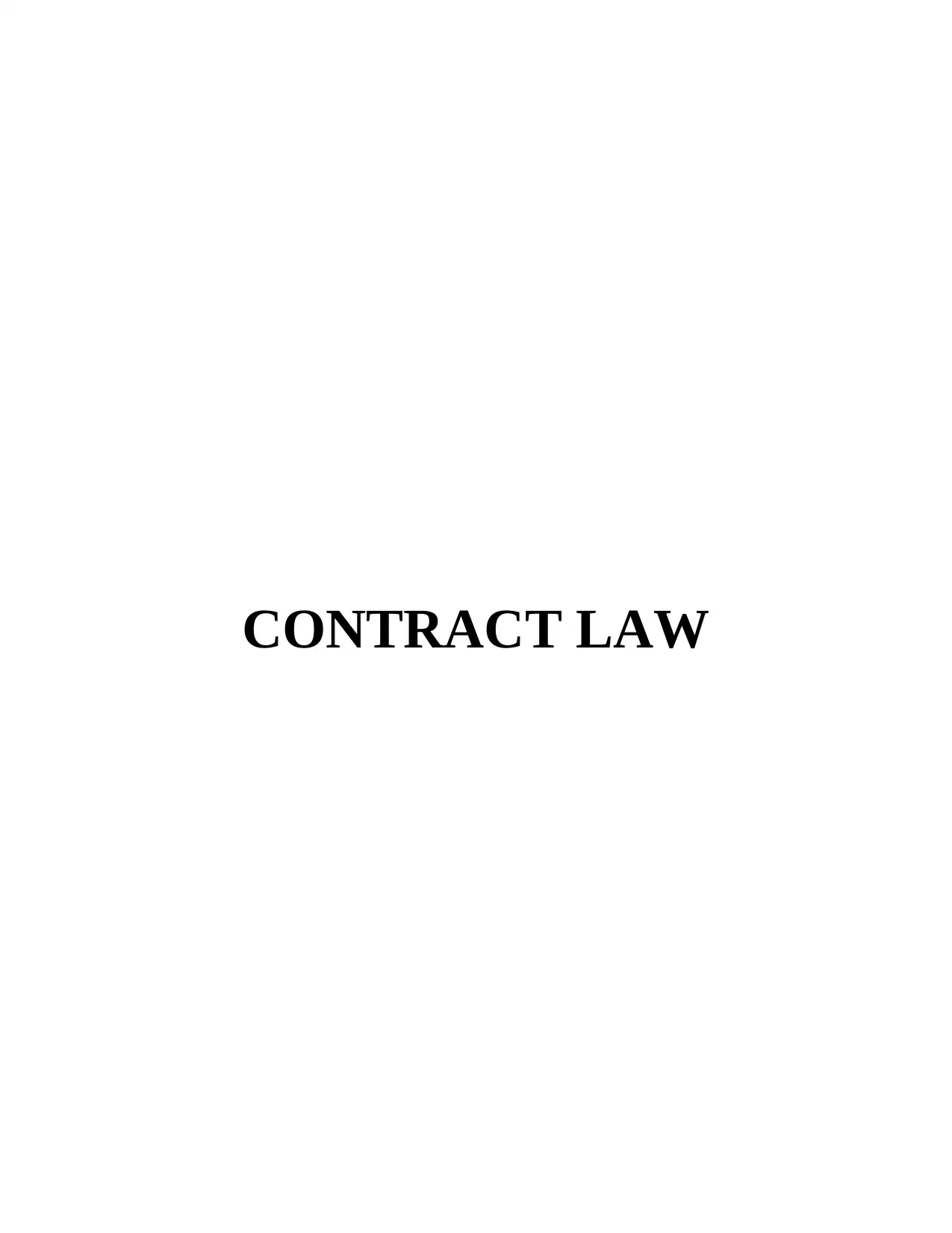
CONTRACT LAW
Paraphrase This Document
Need a fresh take? Get an instant paraphrase of this document with our AI Paraphraser
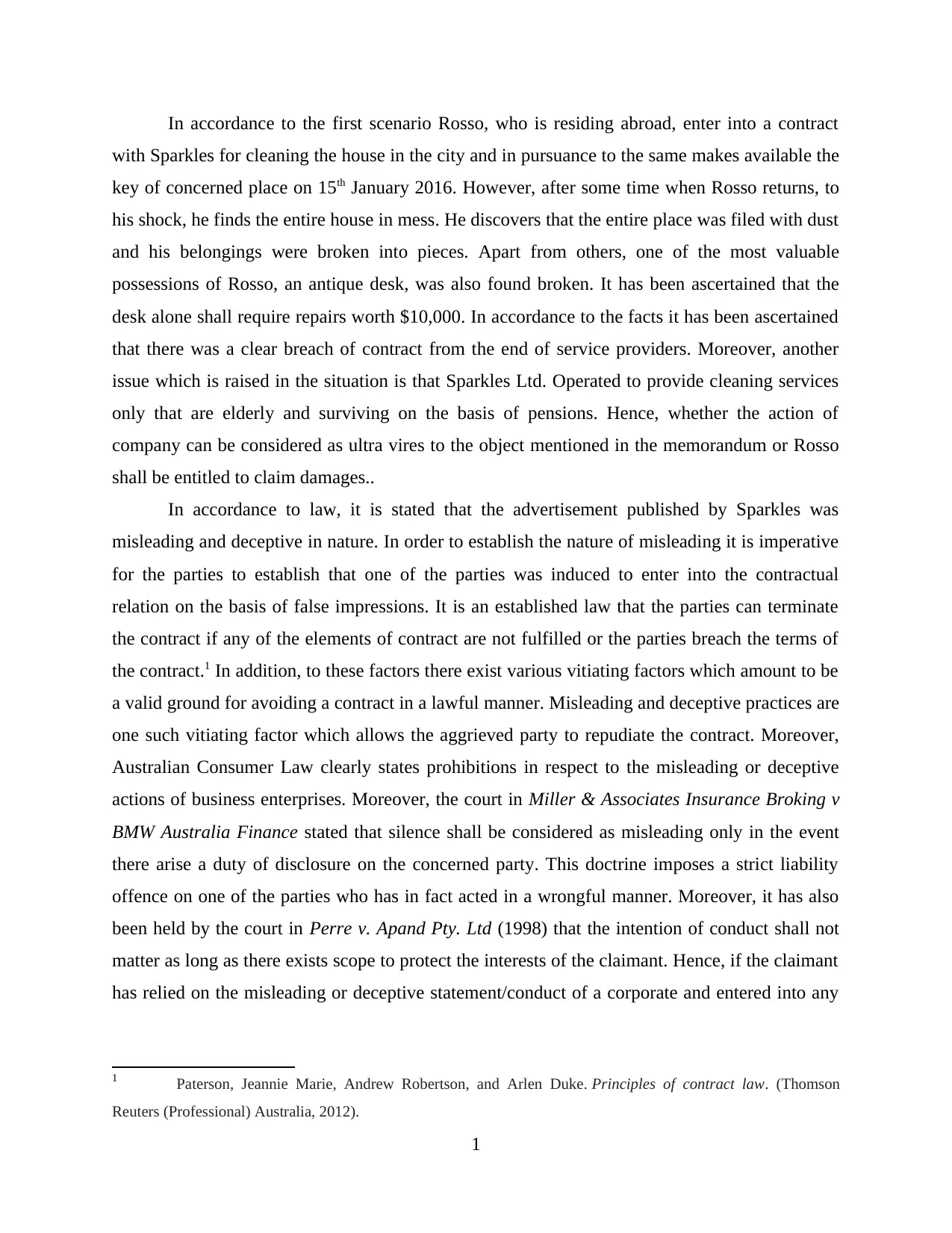
In accordance to the first scenario Rosso, who is residing abroad, enter into a contract
with Sparkles for cleaning the house in the city and in pursuance to the same makes available the
key of concerned place on 15th January 2016. However, after some time when Rosso returns, to
his shock, he finds the entire house in mess. He discovers that the entire place was filed with dust
and his belongings were broken into pieces. Apart from others, one of the most valuable
possessions of Rosso, an antique desk, was also found broken. It has been ascertained that the
desk alone shall require repairs worth $10,000. In accordance to the facts it has been ascertained
that there was a clear breach of contract from the end of service providers. Moreover, another
issue which is raised in the situation is that Sparkles Ltd. Operated to provide cleaning services
only that are elderly and surviving on the basis of pensions. Hence, whether the action of
company can be considered as ultra vires to the object mentioned in the memorandum or Rosso
shall be entitled to claim damages..
In accordance to law, it is stated that the advertisement published by Sparkles was
misleading and deceptive in nature. In order to establish the nature of misleading it is imperative
for the parties to establish that one of the parties was induced to enter into the contractual
relation on the basis of false impressions. It is an established law that the parties can terminate
the contract if any of the elements of contract are not fulfilled or the parties breach the terms of
the contract.1 In addition, to these factors there exist various vitiating factors which amount to be
a valid ground for avoiding a contract in a lawful manner. Misleading and deceptive practices are
one such vitiating factor which allows the aggrieved party to repudiate the contract. Moreover,
Australian Consumer Law clearly states prohibitions in respect to the misleading or deceptive
actions of business enterprises. Moreover, the court in Miller & Associates Insurance Broking v
BMW Australia Finance stated that silence shall be considered as misleading only in the event
there arise a duty of disclosure on the concerned party. This doctrine imposes a strict liability
offence on one of the parties who has in fact acted in a wrongful manner. Moreover, it has also
been held by the court in Perre v. Apand Pty. Ltd (1998) that the intention of conduct shall not
matter as long as there exists scope to protect the interests of the claimant. Hence, if the claimant
has relied on the misleading or deceptive statement/conduct of a corporate and entered into any
1 Paterson, Jeannie Marie, Andrew Robertson, and Arlen Duke. Principles of contract law. (Thomson
Reuters (Professional) Australia, 2012).
1
with Sparkles for cleaning the house in the city and in pursuance to the same makes available the
key of concerned place on 15th January 2016. However, after some time when Rosso returns, to
his shock, he finds the entire house in mess. He discovers that the entire place was filed with dust
and his belongings were broken into pieces. Apart from others, one of the most valuable
possessions of Rosso, an antique desk, was also found broken. It has been ascertained that the
desk alone shall require repairs worth $10,000. In accordance to the facts it has been ascertained
that there was a clear breach of contract from the end of service providers. Moreover, another
issue which is raised in the situation is that Sparkles Ltd. Operated to provide cleaning services
only that are elderly and surviving on the basis of pensions. Hence, whether the action of
company can be considered as ultra vires to the object mentioned in the memorandum or Rosso
shall be entitled to claim damages..
In accordance to law, it is stated that the advertisement published by Sparkles was
misleading and deceptive in nature. In order to establish the nature of misleading it is imperative
for the parties to establish that one of the parties was induced to enter into the contractual
relation on the basis of false impressions. It is an established law that the parties can terminate
the contract if any of the elements of contract are not fulfilled or the parties breach the terms of
the contract.1 In addition, to these factors there exist various vitiating factors which amount to be
a valid ground for avoiding a contract in a lawful manner. Misleading and deceptive practices are
one such vitiating factor which allows the aggrieved party to repudiate the contract. Moreover,
Australian Consumer Law clearly states prohibitions in respect to the misleading or deceptive
actions of business enterprises. Moreover, the court in Miller & Associates Insurance Broking v
BMW Australia Finance stated that silence shall be considered as misleading only in the event
there arise a duty of disclosure on the concerned party. This doctrine imposes a strict liability
offence on one of the parties who has in fact acted in a wrongful manner. Moreover, it has also
been held by the court in Perre v. Apand Pty. Ltd (1998) that the intention of conduct shall not
matter as long as there exists scope to protect the interests of the claimant. Hence, if the claimant
has relied on the misleading or deceptive statement/conduct of a corporate and entered into any
1 Paterson, Jeannie Marie, Andrew Robertson, and Arlen Duke. Principles of contract law. (Thomson
Reuters (Professional) Australia, 2012).
1
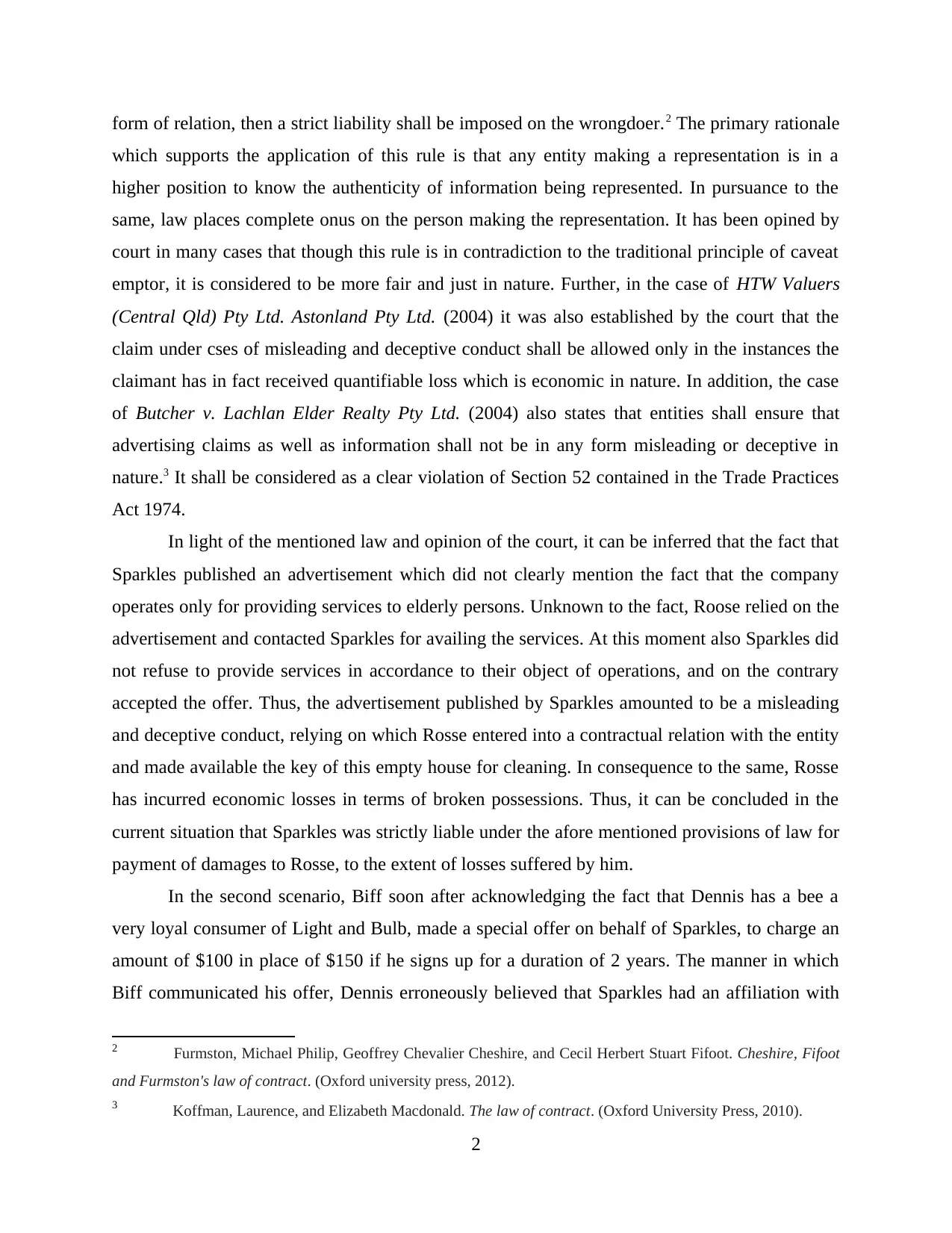
form of relation, then a strict liability shall be imposed on the wrongdoer.2 The primary rationale
which supports the application of this rule is that any entity making a representation is in a
higher position to know the authenticity of information being represented. In pursuance to the
same, law places complete onus on the person making the representation. It has been opined by
court in many cases that though this rule is in contradiction to the traditional principle of caveat
emptor, it is considered to be more fair and just in nature. Further, in the case of HTW Valuers
(Central Qld) Pty Ltd. Astonland Pty Ltd. (2004) it was also established by the court that the
claim under cses of misleading and deceptive conduct shall be allowed only in the instances the
claimant has in fact received quantifiable loss which is economic in nature. In addition, the case
of Butcher v. Lachlan Elder Realty Pty Ltd. (2004) also states that entities shall ensure that
advertising claims as well as information shall not be in any form misleading or deceptive in
nature.3 It shall be considered as a clear violation of Section 52 contained in the Trade Practices
Act 1974.
In light of the mentioned law and opinion of the court, it can be inferred that the fact that
Sparkles published an advertisement which did not clearly mention the fact that the company
operates only for providing services to elderly persons. Unknown to the fact, Roose relied on the
advertisement and contacted Sparkles for availing the services. At this moment also Sparkles did
not refuse to provide services in accordance to their object of operations, and on the contrary
accepted the offer. Thus, the advertisement published by Sparkles amounted to be a misleading
and deceptive conduct, relying on which Rosse entered into a contractual relation with the entity
and made available the key of this empty house for cleaning. In consequence to the same, Rosse
has incurred economic losses in terms of broken possessions. Thus, it can be concluded in the
current situation that Sparkles was strictly liable under the afore mentioned provisions of law for
payment of damages to Rosse, to the extent of losses suffered by him.
In the second scenario, Biff soon after acknowledging the fact that Dennis has a bee a
very loyal consumer of Light and Bulb, made a special offer on behalf of Sparkles, to charge an
amount of $100 in place of $150 if he signs up for a duration of 2 years. The manner in which
Biff communicated his offer, Dennis erroneously believed that Sparkles had an affiliation with
2 Furmston, Michael Philip, Geoffrey Chevalier Cheshire, and Cecil Herbert Stuart Fifoot. Cheshire, Fifoot
and Furmston's law of contract. (Oxford university press, 2012).
3 Koffman, Laurence, and Elizabeth Macdonald. The law of contract. (Oxford University Press, 2010).
2
which supports the application of this rule is that any entity making a representation is in a
higher position to know the authenticity of information being represented. In pursuance to the
same, law places complete onus on the person making the representation. It has been opined by
court in many cases that though this rule is in contradiction to the traditional principle of caveat
emptor, it is considered to be more fair and just in nature. Further, in the case of HTW Valuers
(Central Qld) Pty Ltd. Astonland Pty Ltd. (2004) it was also established by the court that the
claim under cses of misleading and deceptive conduct shall be allowed only in the instances the
claimant has in fact received quantifiable loss which is economic in nature. In addition, the case
of Butcher v. Lachlan Elder Realty Pty Ltd. (2004) also states that entities shall ensure that
advertising claims as well as information shall not be in any form misleading or deceptive in
nature.3 It shall be considered as a clear violation of Section 52 contained in the Trade Practices
Act 1974.
In light of the mentioned law and opinion of the court, it can be inferred that the fact that
Sparkles published an advertisement which did not clearly mention the fact that the company
operates only for providing services to elderly persons. Unknown to the fact, Roose relied on the
advertisement and contacted Sparkles for availing the services. At this moment also Sparkles did
not refuse to provide services in accordance to their object of operations, and on the contrary
accepted the offer. Thus, the advertisement published by Sparkles amounted to be a misleading
and deceptive conduct, relying on which Rosse entered into a contractual relation with the entity
and made available the key of this empty house for cleaning. In consequence to the same, Rosse
has incurred economic losses in terms of broken possessions. Thus, it can be concluded in the
current situation that Sparkles was strictly liable under the afore mentioned provisions of law for
payment of damages to Rosse, to the extent of losses suffered by him.
In the second scenario, Biff soon after acknowledging the fact that Dennis has a bee a
very loyal consumer of Light and Bulb, made a special offer on behalf of Sparkles, to charge an
amount of $100 in place of $150 if he signs up for a duration of 2 years. The manner in which
Biff communicated his offer, Dennis erroneously believed that Sparkles had an affiliation with
2 Furmston, Michael Philip, Geoffrey Chevalier Cheshire, and Cecil Herbert Stuart Fifoot. Cheshire, Fifoot
and Furmston's law of contract. (Oxford university press, 2012).
3 Koffman, Laurence, and Elizabeth Macdonald. The law of contract. (Oxford University Press, 2010).
2
⊘ This is a preview!⊘
Do you want full access?
Subscribe today to unlock all pages.

Trusted by 1+ million students worldwide
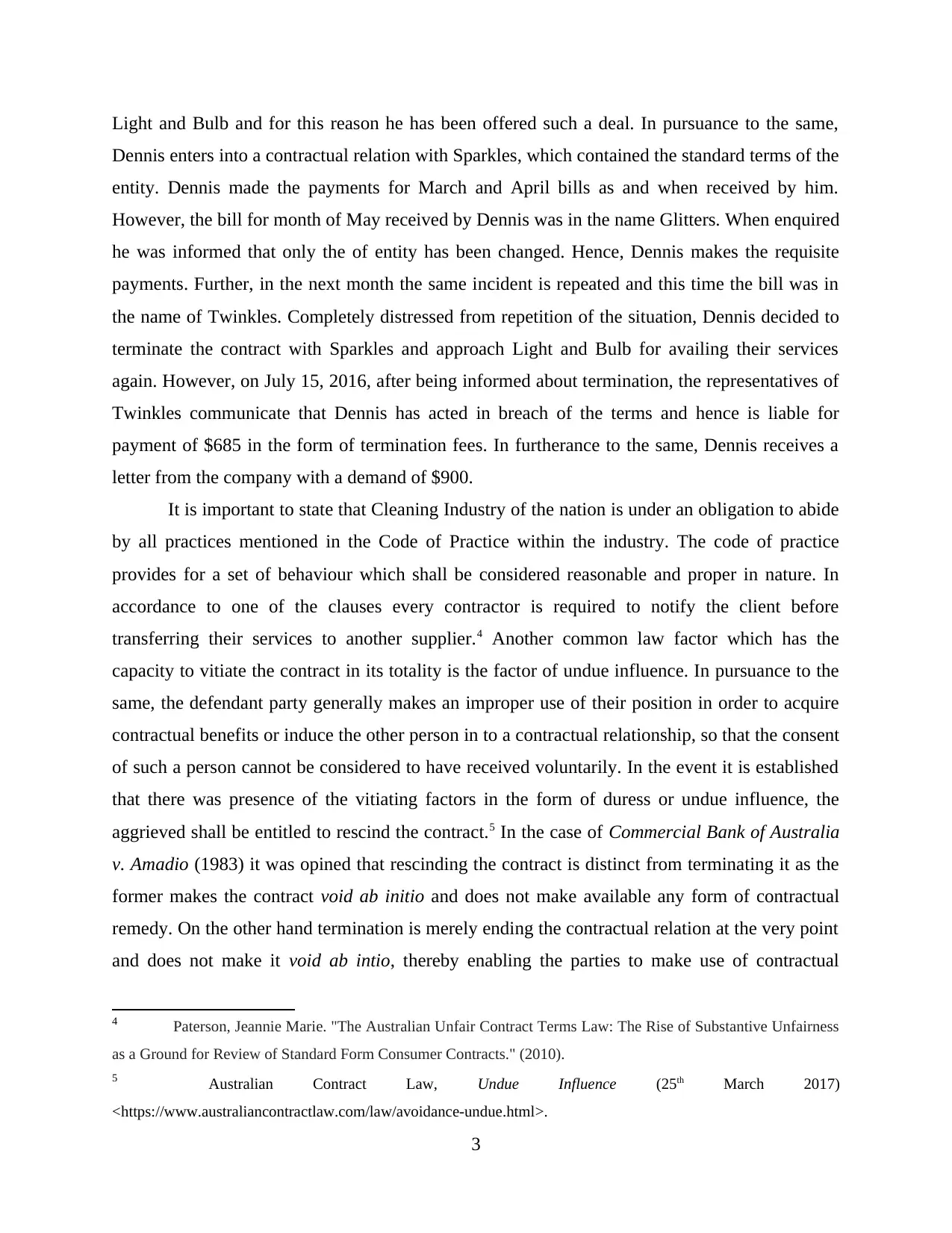
Light and Bulb and for this reason he has been offered such a deal. In pursuance to the same,
Dennis enters into a contractual relation with Sparkles, which contained the standard terms of the
entity. Dennis made the payments for March and April bills as and when received by him.
However, the bill for month of May received by Dennis was in the name Glitters. When enquired
he was informed that only the of entity has been changed. Hence, Dennis makes the requisite
payments. Further, in the next month the same incident is repeated and this time the bill was in
the name of Twinkles. Completely distressed from repetition of the situation, Dennis decided to
terminate the contract with Sparkles and approach Light and Bulb for availing their services
again. However, on July 15, 2016, after being informed about termination, the representatives of
Twinkles communicate that Dennis has acted in breach of the terms and hence is liable for
payment of $685 in the form of termination fees. In furtherance to the same, Dennis receives a
letter from the company with a demand of $900.
It is important to state that Cleaning Industry of the nation is under an obligation to abide
by all practices mentioned in the Code of Practice within the industry. The code of practice
provides for a set of behaviour which shall be considered reasonable and proper in nature. In
accordance to one of the clauses every contractor is required to notify the client before
transferring their services to another supplier.4 Another common law factor which has the
capacity to vitiate the contract in its totality is the factor of undue influence. In pursuance to the
same, the defendant party generally makes an improper use of their position in order to acquire
contractual benefits or induce the other person in to a contractual relationship, so that the consent
of such a person cannot be considered to have received voluntarily. In the event it is established
that there was presence of the vitiating factors in the form of duress or undue influence, the
aggrieved shall be entitled to rescind the contract.5 In the case of Commercial Bank of Australia
v. Amadio (1983) it was opined that rescinding the contract is distinct from terminating it as the
former makes the contract void ab initio and does not make available any form of contractual
remedy. On the other hand termination is merely ending the contractual relation at the very point
and does not make it void ab intio, thereby enabling the parties to make use of contractual
4 Paterson, Jeannie Marie. "The Australian Unfair Contract Terms Law: The Rise of Substantive Unfairness
as a Ground for Review of Standard Form Consumer Contracts." (2010).
5 Australian Contract Law, Undue Influence (25th March 2017)
<https://www.australiancontractlaw.com/law/avoidance-undue.html>.
3
Dennis enters into a contractual relation with Sparkles, which contained the standard terms of the
entity. Dennis made the payments for March and April bills as and when received by him.
However, the bill for month of May received by Dennis was in the name Glitters. When enquired
he was informed that only the of entity has been changed. Hence, Dennis makes the requisite
payments. Further, in the next month the same incident is repeated and this time the bill was in
the name of Twinkles. Completely distressed from repetition of the situation, Dennis decided to
terminate the contract with Sparkles and approach Light and Bulb for availing their services
again. However, on July 15, 2016, after being informed about termination, the representatives of
Twinkles communicate that Dennis has acted in breach of the terms and hence is liable for
payment of $685 in the form of termination fees. In furtherance to the same, Dennis receives a
letter from the company with a demand of $900.
It is important to state that Cleaning Industry of the nation is under an obligation to abide
by all practices mentioned in the Code of Practice within the industry. The code of practice
provides for a set of behaviour which shall be considered reasonable and proper in nature. In
accordance to one of the clauses every contractor is required to notify the client before
transferring their services to another supplier.4 Another common law factor which has the
capacity to vitiate the contract in its totality is the factor of undue influence. In pursuance to the
same, the defendant party generally makes an improper use of their position in order to acquire
contractual benefits or induce the other person in to a contractual relationship, so that the consent
of such a person cannot be considered to have received voluntarily. In the event it is established
that there was presence of the vitiating factors in the form of duress or undue influence, the
aggrieved shall be entitled to rescind the contract.5 In the case of Commercial Bank of Australia
v. Amadio (1983) it was opined that rescinding the contract is distinct from terminating it as the
former makes the contract void ab initio and does not make available any form of contractual
remedy. On the other hand termination is merely ending the contractual relation at the very point
and does not make it void ab intio, thereby enabling the parties to make use of contractual
4 Paterson, Jeannie Marie. "The Australian Unfair Contract Terms Law: The Rise of Substantive Unfairness
as a Ground for Review of Standard Form Consumer Contracts." (2010).
5 Australian Contract Law, Undue Influence (25th March 2017)
<https://www.australiancontractlaw.com/law/avoidance-undue.html>.
3
Paraphrase This Document
Need a fresh take? Get an instant paraphrase of this document with our AI Paraphraser
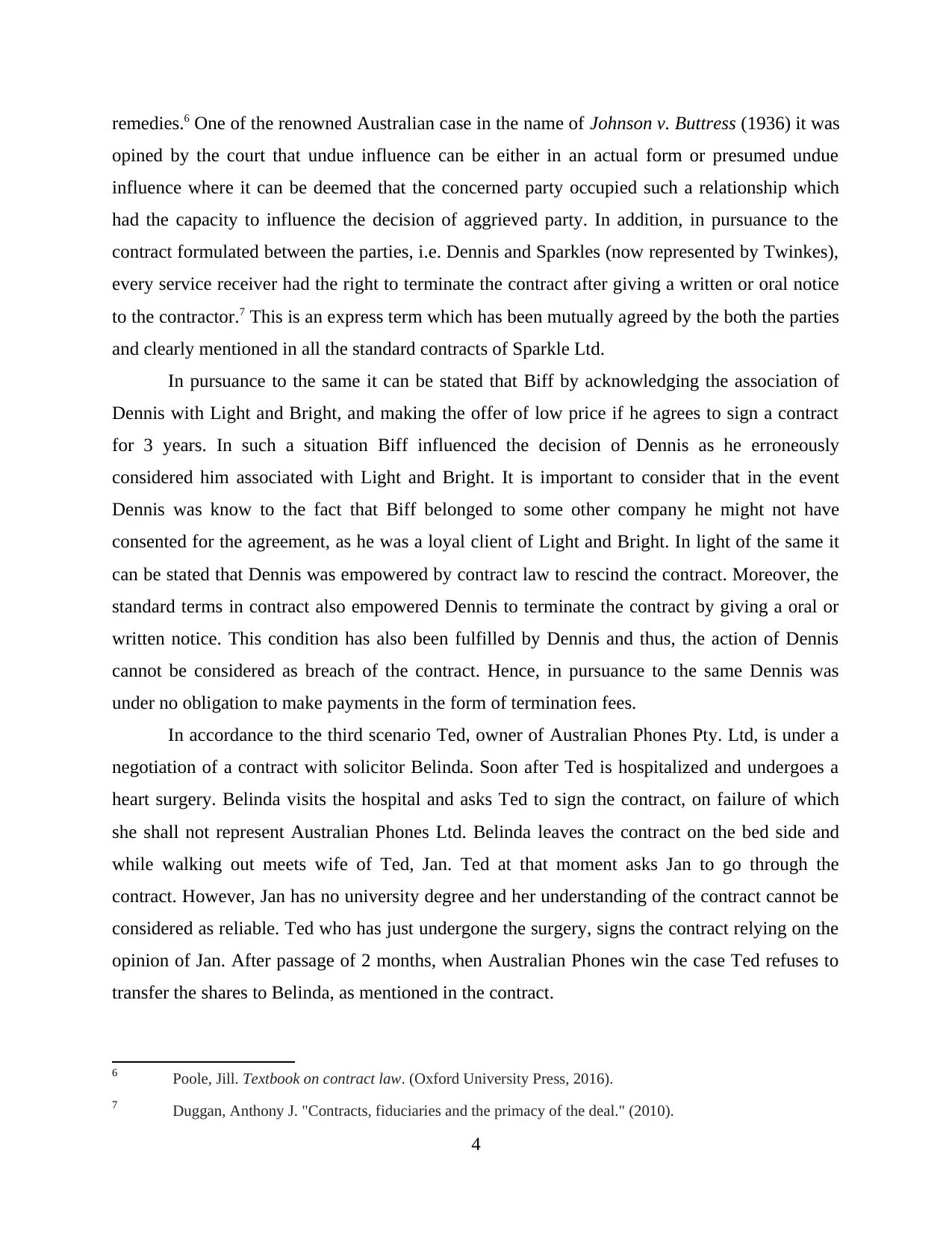
remedies.6 One of the renowned Australian case in the name of Johnson v. Buttress (1936) it was
opined by the court that undue influence can be either in an actual form or presumed undue
influence where it can be deemed that the concerned party occupied such a relationship which
had the capacity to influence the decision of aggrieved party. In addition, in pursuance to the
contract formulated between the parties, i.e. Dennis and Sparkles (now represented by Twinkes),
every service receiver had the right to terminate the contract after giving a written or oral notice
to the contractor.7 This is an express term which has been mutually agreed by the both the parties
and clearly mentioned in all the standard contracts of Sparkle Ltd.
In pursuance to the same it can be stated that Biff by acknowledging the association of
Dennis with Light and Bright, and making the offer of low price if he agrees to sign a contract
for 3 years. In such a situation Biff influenced the decision of Dennis as he erroneously
considered him associated with Light and Bright. It is important to consider that in the event
Dennis was know to the fact that Biff belonged to some other company he might not have
consented for the agreement, as he was a loyal client of Light and Bright. In light of the same it
can be stated that Dennis was empowered by contract law to rescind the contract. Moreover, the
standard terms in contract also empowered Dennis to terminate the contract by giving a oral or
written notice. This condition has also been fulfilled by Dennis and thus, the action of Dennis
cannot be considered as breach of the contract. Hence, in pursuance to the same Dennis was
under no obligation to make payments in the form of termination fees.
In accordance to the third scenario Ted, owner of Australian Phones Pty. Ltd, is under a
negotiation of a contract with solicitor Belinda. Soon after Ted is hospitalized and undergoes a
heart surgery. Belinda visits the hospital and asks Ted to sign the contract, on failure of which
she shall not represent Australian Phones Ltd. Belinda leaves the contract on the bed side and
while walking out meets wife of Ted, Jan. Ted at that moment asks Jan to go through the
contract. However, Jan has no university degree and her understanding of the contract cannot be
considered as reliable. Ted who has just undergone the surgery, signs the contract relying on the
opinion of Jan. After passage of 2 months, when Australian Phones win the case Ted refuses to
transfer the shares to Belinda, as mentioned in the contract.
6 Poole, Jill. Textbook on contract law. (Oxford University Press, 2016).
7 Duggan, Anthony J. "Contracts, fiduciaries and the primacy of the deal." (2010).
4
opined by the court that undue influence can be either in an actual form or presumed undue
influence where it can be deemed that the concerned party occupied such a relationship which
had the capacity to influence the decision of aggrieved party. In addition, in pursuance to the
contract formulated between the parties, i.e. Dennis and Sparkles (now represented by Twinkes),
every service receiver had the right to terminate the contract after giving a written or oral notice
to the contractor.7 This is an express term which has been mutually agreed by the both the parties
and clearly mentioned in all the standard contracts of Sparkle Ltd.
In pursuance to the same it can be stated that Biff by acknowledging the association of
Dennis with Light and Bright, and making the offer of low price if he agrees to sign a contract
for 3 years. In such a situation Biff influenced the decision of Dennis as he erroneously
considered him associated with Light and Bright. It is important to consider that in the event
Dennis was know to the fact that Biff belonged to some other company he might not have
consented for the agreement, as he was a loyal client of Light and Bright. In light of the same it
can be stated that Dennis was empowered by contract law to rescind the contract. Moreover, the
standard terms in contract also empowered Dennis to terminate the contract by giving a oral or
written notice. This condition has also been fulfilled by Dennis and thus, the action of Dennis
cannot be considered as breach of the contract. Hence, in pursuance to the same Dennis was
under no obligation to make payments in the form of termination fees.
In accordance to the third scenario Ted, owner of Australian Phones Pty. Ltd, is under a
negotiation of a contract with solicitor Belinda. Soon after Ted is hospitalized and undergoes a
heart surgery. Belinda visits the hospital and asks Ted to sign the contract, on failure of which
she shall not represent Australian Phones Ltd. Belinda leaves the contract on the bed side and
while walking out meets wife of Ted, Jan. Ted at that moment asks Jan to go through the
contract. However, Jan has no university degree and her understanding of the contract cannot be
considered as reliable. Ted who has just undergone the surgery, signs the contract relying on the
opinion of Jan. After passage of 2 months, when Australian Phones win the case Ted refuses to
transfer the shares to Belinda, as mentioned in the contract.
6 Poole, Jill. Textbook on contract law. (Oxford University Press, 2016).
7 Duggan, Anthony J. "Contracts, fiduciaries and the primacy of the deal." (2010).
4
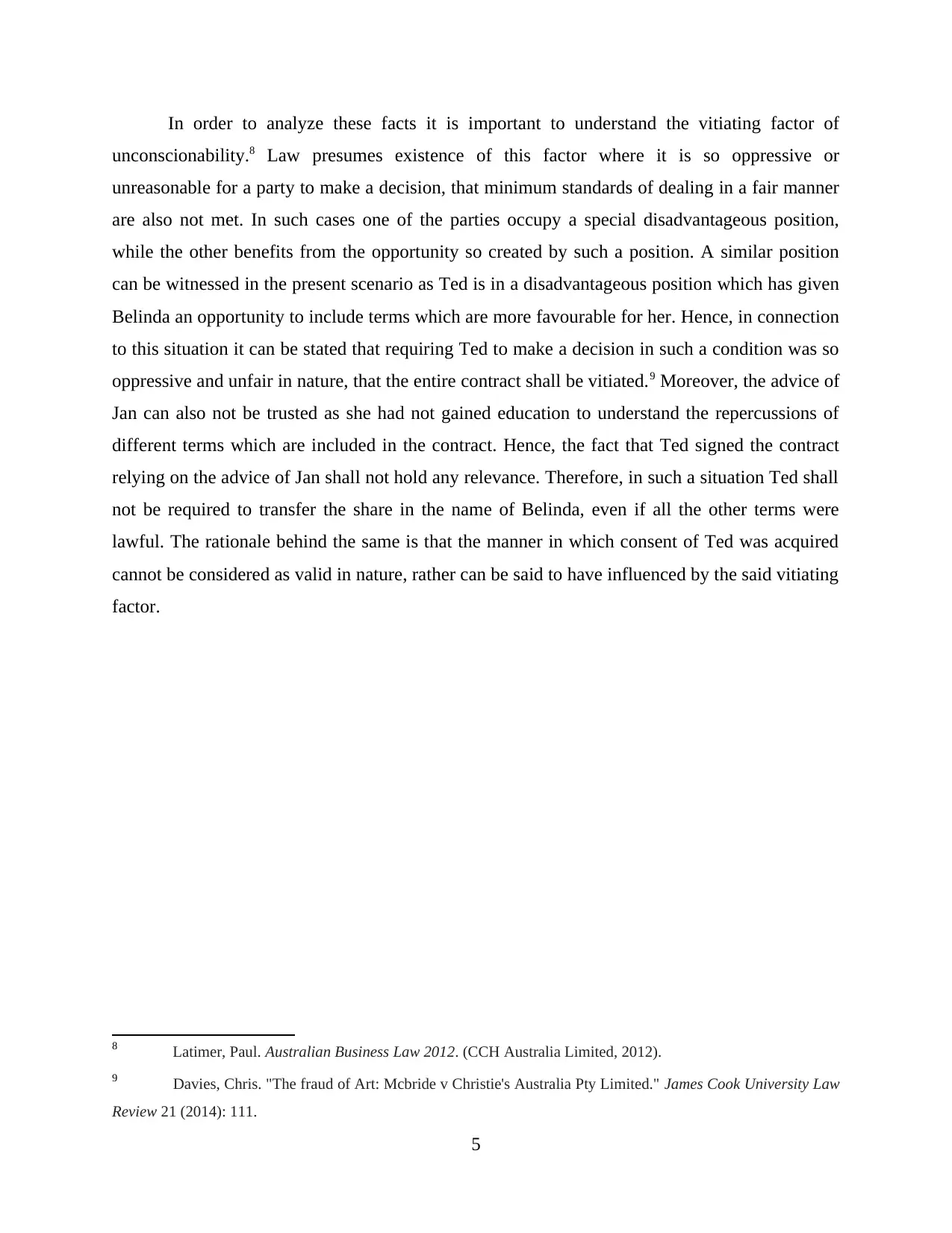
In order to analyze these facts it is important to understand the vitiating factor of
unconscionability.8 Law presumes existence of this factor where it is so oppressive or
unreasonable for a party to make a decision, that minimum standards of dealing in a fair manner
are also not met. In such cases one of the parties occupy a special disadvantageous position,
while the other benefits from the opportunity so created by such a position. A similar position
can be witnessed in the present scenario as Ted is in a disadvantageous position which has given
Belinda an opportunity to include terms which are more favourable for her. Hence, in connection
to this situation it can be stated that requiring Ted to make a decision in such a condition was so
oppressive and unfair in nature, that the entire contract shall be vitiated.9 Moreover, the advice of
Jan can also not be trusted as she had not gained education to understand the repercussions of
different terms which are included in the contract. Hence, the fact that Ted signed the contract
relying on the advice of Jan shall not hold any relevance. Therefore, in such a situation Ted shall
not be required to transfer the share in the name of Belinda, even if all the other terms were
lawful. The rationale behind the same is that the manner in which consent of Ted was acquired
cannot be considered as valid in nature, rather can be said to have influenced by the said vitiating
factor.
8 Latimer, Paul. Australian Business Law 2012. (CCH Australia Limited, 2012).
9 Davies, Chris. "The fraud of Art: Mcbride v Christie's Australia Pty Limited." James Cook University Law
Review 21 (2014): 111.
5
unconscionability.8 Law presumes existence of this factor where it is so oppressive or
unreasonable for a party to make a decision, that minimum standards of dealing in a fair manner
are also not met. In such cases one of the parties occupy a special disadvantageous position,
while the other benefits from the opportunity so created by such a position. A similar position
can be witnessed in the present scenario as Ted is in a disadvantageous position which has given
Belinda an opportunity to include terms which are more favourable for her. Hence, in connection
to this situation it can be stated that requiring Ted to make a decision in such a condition was so
oppressive and unfair in nature, that the entire contract shall be vitiated.9 Moreover, the advice of
Jan can also not be trusted as she had not gained education to understand the repercussions of
different terms which are included in the contract. Hence, the fact that Ted signed the contract
relying on the advice of Jan shall not hold any relevance. Therefore, in such a situation Ted shall
not be required to transfer the share in the name of Belinda, even if all the other terms were
lawful. The rationale behind the same is that the manner in which consent of Ted was acquired
cannot be considered as valid in nature, rather can be said to have influenced by the said vitiating
factor.
8 Latimer, Paul. Australian Business Law 2012. (CCH Australia Limited, 2012).
9 Davies, Chris. "The fraud of Art: Mcbride v Christie's Australia Pty Limited." James Cook University Law
Review 21 (2014): 111.
5
⊘ This is a preview!⊘
Do you want full access?
Subscribe today to unlock all pages.

Trusted by 1+ million students worldwide
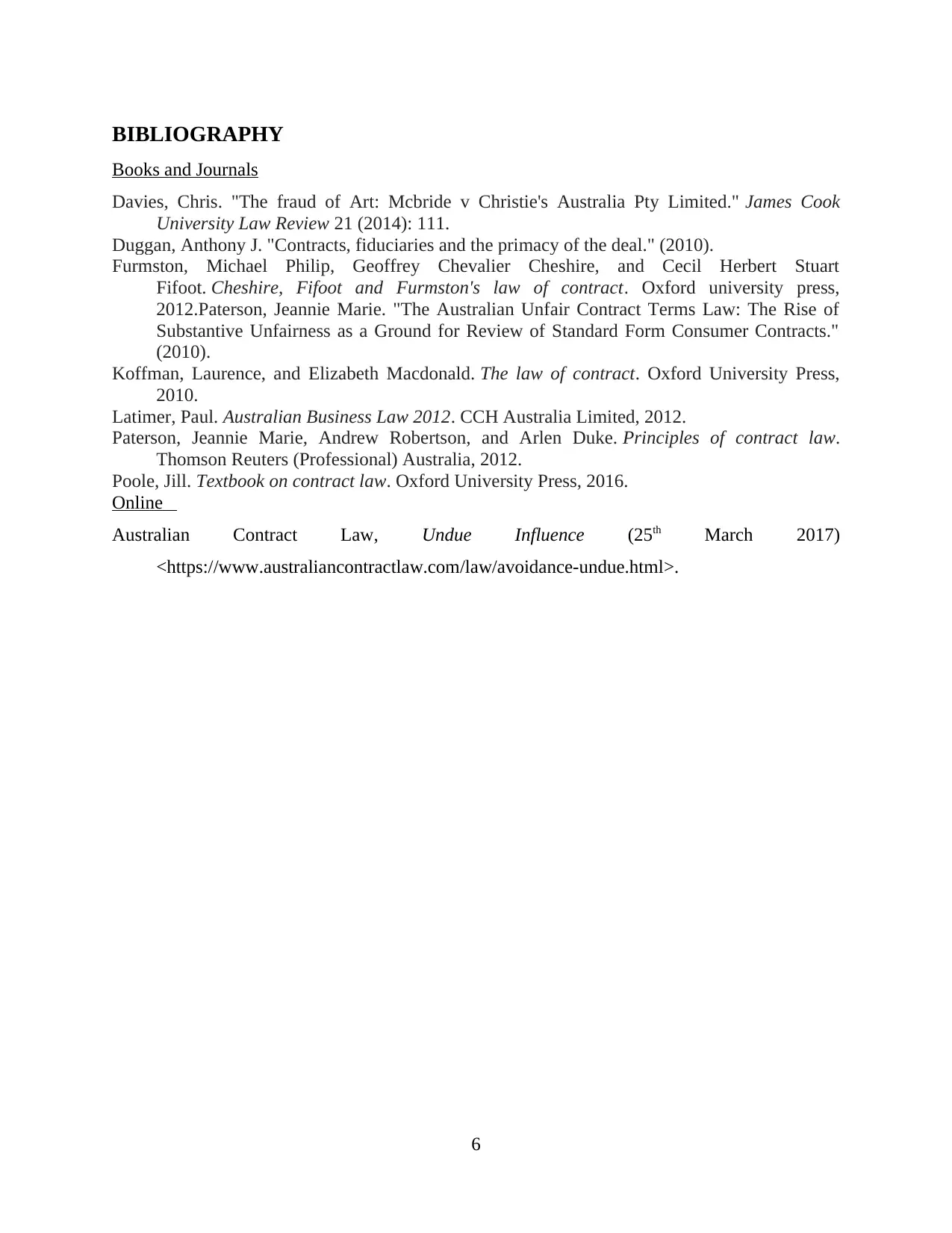
BIBLIOGRAPHY
Books and Journals
Davies, Chris. "The fraud of Art: Mcbride v Christie's Australia Pty Limited." James Cook
University Law Review 21 (2014): 111.
Duggan, Anthony J. "Contracts, fiduciaries and the primacy of the deal." (2010).
Furmston, Michael Philip, Geoffrey Chevalier Cheshire, and Cecil Herbert Stuart
Fifoot. Cheshire, Fifoot and Furmston's law of contract. Oxford university press,
2012.Paterson, Jeannie Marie. "The Australian Unfair Contract Terms Law: The Rise of
Substantive Unfairness as a Ground for Review of Standard Form Consumer Contracts."
(2010).
Koffman, Laurence, and Elizabeth Macdonald. The law of contract. Oxford University Press,
2010.
Latimer, Paul. Australian Business Law 2012. CCH Australia Limited, 2012.
Paterson, Jeannie Marie, Andrew Robertson, and Arlen Duke. Principles of contract law.
Thomson Reuters (Professional) Australia, 2012.
Poole, Jill. Textbook on contract law. Oxford University Press, 2016.
Online
Australian Contract Law, Undue Influence (25th March 2017)
<https://www.australiancontractlaw.com/law/avoidance-undue.html>.
6
Books and Journals
Davies, Chris. "The fraud of Art: Mcbride v Christie's Australia Pty Limited." James Cook
University Law Review 21 (2014): 111.
Duggan, Anthony J. "Contracts, fiduciaries and the primacy of the deal." (2010).
Furmston, Michael Philip, Geoffrey Chevalier Cheshire, and Cecil Herbert Stuart
Fifoot. Cheshire, Fifoot and Furmston's law of contract. Oxford university press,
2012.Paterson, Jeannie Marie. "The Australian Unfair Contract Terms Law: The Rise of
Substantive Unfairness as a Ground for Review of Standard Form Consumer Contracts."
(2010).
Koffman, Laurence, and Elizabeth Macdonald. The law of contract. Oxford University Press,
2010.
Latimer, Paul. Australian Business Law 2012. CCH Australia Limited, 2012.
Paterson, Jeannie Marie, Andrew Robertson, and Arlen Duke. Principles of contract law.
Thomson Reuters (Professional) Australia, 2012.
Poole, Jill. Textbook on contract law. Oxford University Press, 2016.
Online
Australian Contract Law, Undue Influence (25th March 2017)
<https://www.australiancontractlaw.com/law/avoidance-undue.html>.
6
1 out of 7
Related Documents
Your All-in-One AI-Powered Toolkit for Academic Success.
+13062052269
info@desklib.com
Available 24*7 on WhatsApp / Email
![[object Object]](/_next/static/media/star-bottom.7253800d.svg)
Unlock your academic potential
Copyright © 2020–2026 A2Z Services. All Rights Reserved. Developed and managed by ZUCOL.



